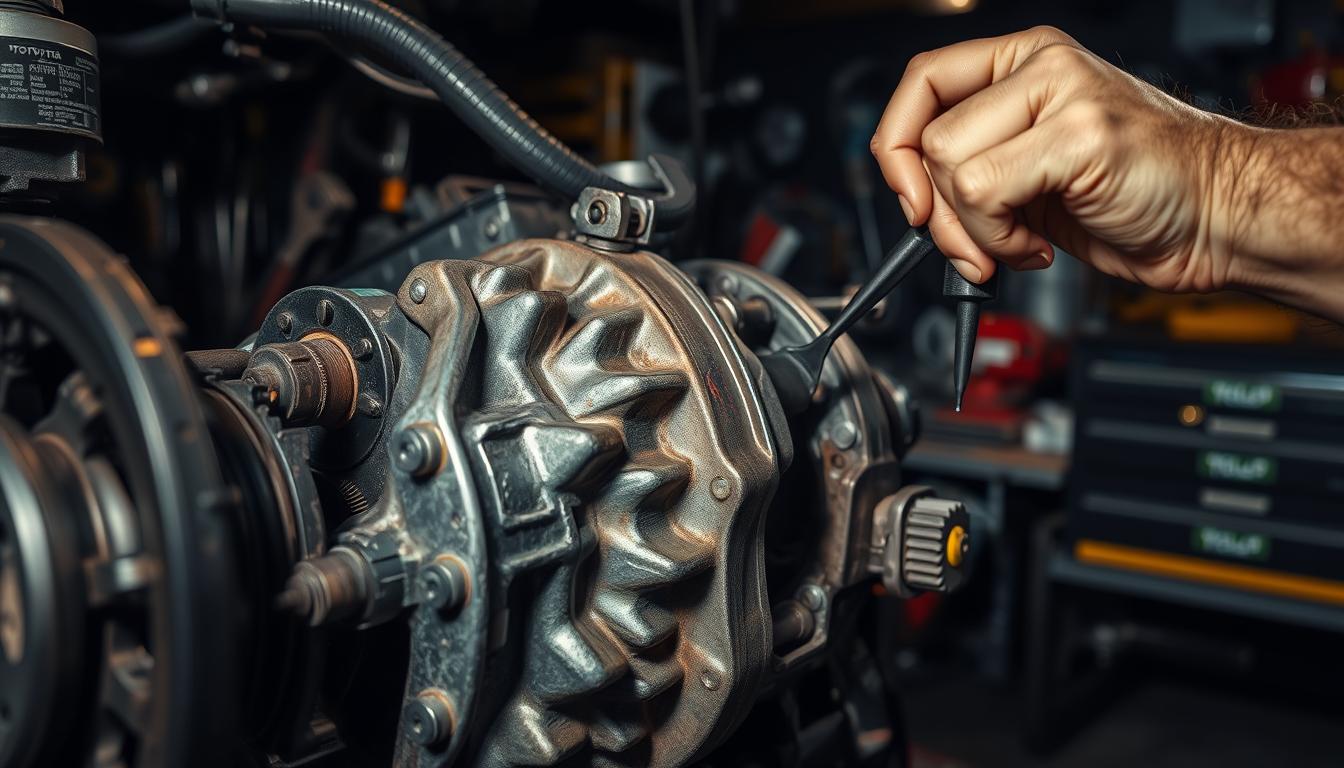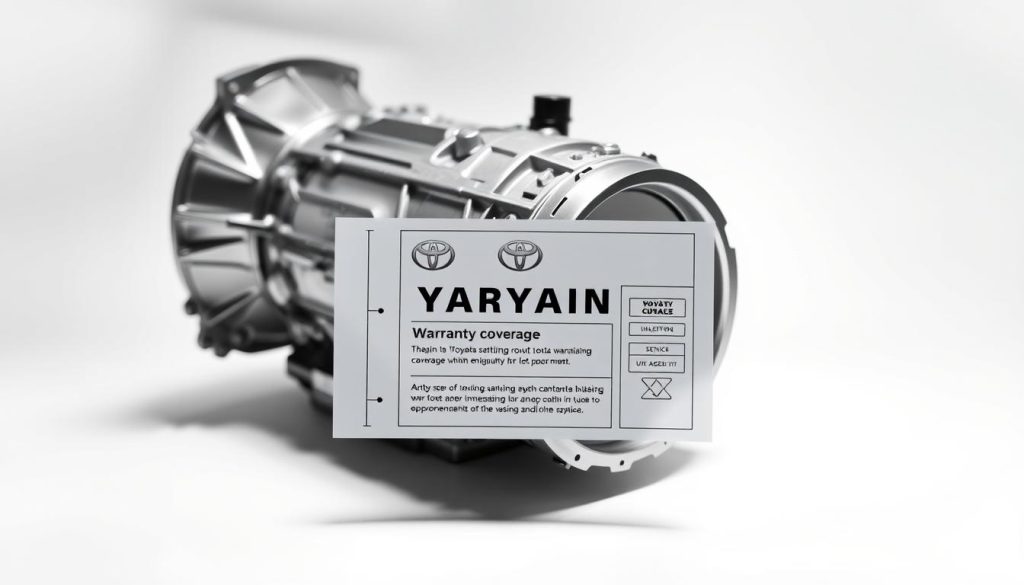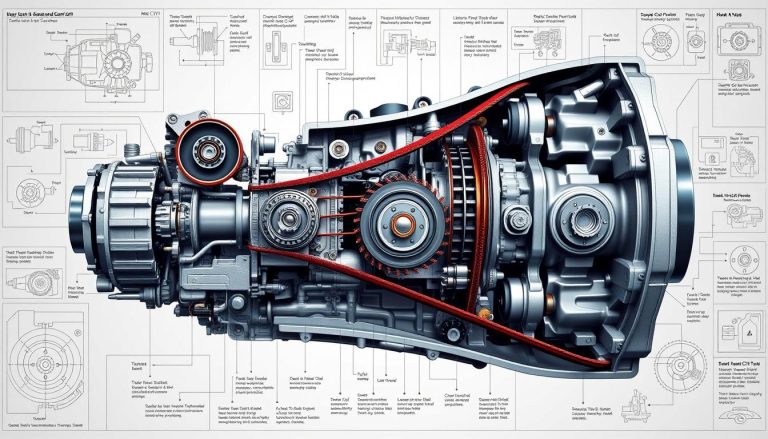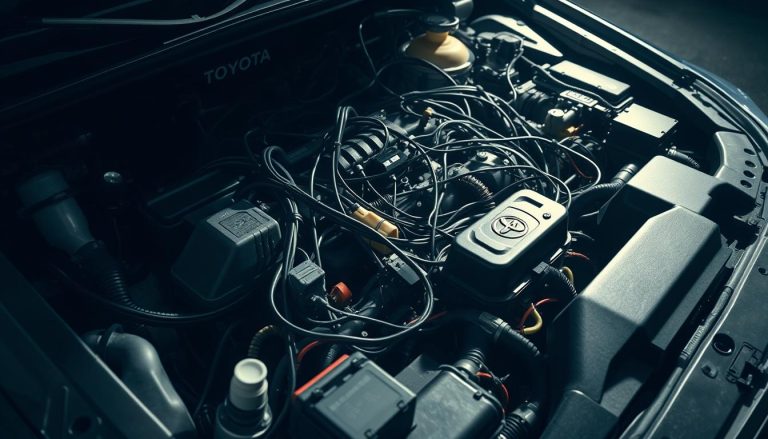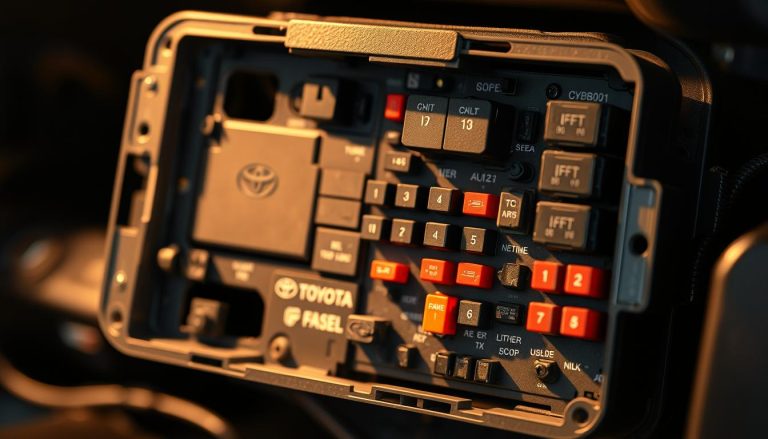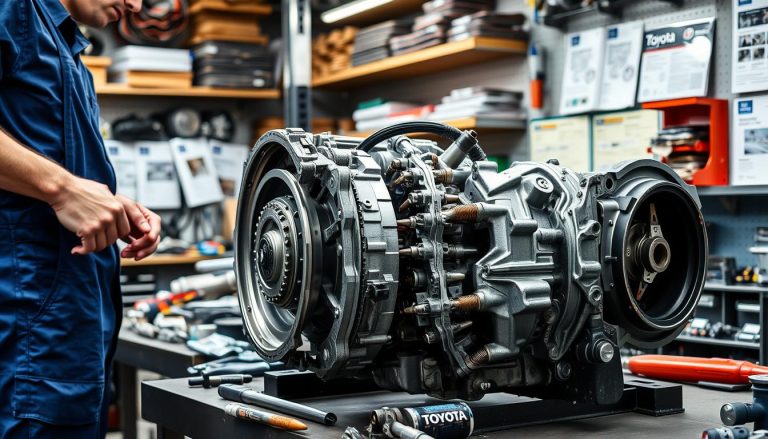Toyota Automatic Transmission Issues Explained
Knowing about Toyota transmission problems is key for car owners. It helps keep your vehicle running well and lasting longer. Fixing Toyota automatic transmission issues early can save you from expensive repairs later. This guide will cover common symptoms, causes, and fixes to help you manage these problems.
Be aware of the usual signs of transmission trouble to keep your Toyota reliable and efficient. If you notice your car jerking or making odd noises, we’ve got advice for you. Let’s dive into the details of your Toyota’s automatic transmission. This way, you’ll be ready to tackle any issues that come up.
Introduction to Toyota Automatic Transmissions
Automatic transmissions have changed driving for the better. They make shifting gears easy and smooth. For Toyota owners, knowing how these systems work is key to keeping their cars in top shape.
These transmissions use gears, fluid, and computers to shift gears smoothly. This makes driving more comfortable and easy. It’s why many people choose automatics over manuals.
Automatics are great for city driving, smooth starts, and less driver effort. But, knowing about is important. Spotting and fixing common issues early can save you money and keep your car running well.
If your car jerks, slips gears, or hesitates, knowing how to fix it can be a big help. Regular checks and quick fixes are vital for your transmission’s health. With the right info, your car will keep running smoothly.
Common Symptoms of Toyota Transmission Problems
Knowing the signs of Toyota transmission failures can help fix issues early. Spotting these signs can avoid bigger problems and expensive repairs. Here are some key indicators to watch for:
Jerky or Slipping Acceleration
Feeling jerky or slipping when you accelerate is a common sign. It might mean worn-out gears or a fluid problem. If your car hesitates or moves suddenly during shifts, it’s a warning.
Weird Noises
Grinding, whining, or odd noises while driving or shifting are red flags. Troubleshooting Toyota automatic transmission means listening for unusual sounds. These could mean wear or damage inside the transmission.
Delayed Response/Shifting
A delayed response when shifting gears is another sign of trouble. If there’s a lag before the gear engages, it could be a problem.
Check Engine Light
The check engine light can mean many things, but the transmission is often a cause. It means the car’s computer has found an issue. Using the service manual and OBD2 scanners can help fix problems.
Overheating Warnings
Overheating warnings on your dashboard are serious. They can cause big damage and even fail the transmission. Regular checks and maintenance can prevent this.
| Symptom | Possible Cause |
|---|---|
| Jerky or Slipping Acceleration | Worn-out gears, low transmission fluid |
| Weird Noises | Internal wear, damaged components |
| Delayed Response/Shifting | Internal issue, low fluid levels |
| Check Engine Light | Various possible problems |
| Overheating Warnings | High temperature, inadequate fluid |
Toyota Automatic Transmission Problems
Toyota automatic transmission problems can show up in many ways across different models. Knowing these issues helps car owners spot and fix problems early. Common problems include delayed shifts, slipping gears, and odd noises. These often come from mechanical or electronic faults.
Delayed shifting is a big issue. It happens when the transmission takes too long to switch gears, causing jerky movements or bad fuel efficiency. This can be due to worn clutches, low fluid, or software problems.
Gear slipping is another common problem. It makes the car speed drop suddenly and can be dangerous. It’s caused by worn bands, solenoid issues, or dirty fluid. Checking the fluid regularly is key to Toyota transmission care.
Unusual noises, like grinding or whining, point to deeper mechanical issues. These sounds might mean problems with the torque converter or internal gears. Catching these sounds early and getting them fixed can stop more damage.
Toyota has fixed many transmission problems with recalls and software updates. But car owners must stay alert. Keeping up with Toyota’s maintenance tips can make your transmission last longer and work better.
Here’s a table that lists common Toyota automatic transmission problems, their signs, and what might cause them.
| Problem | Symptoms | Potential Causes |
|---|---|---|
| Delayed Shifting | Jerky movements, poor fuel efficiency | Worn clutches, low fluid, software issues |
| Gear Slipping | Sudden drops in speed, dangerous driving conditions | Worn bands, solenoid issues, fluid contamination |
| Unusual Noises | Grinding or whining sounds | Torque converter issues, internal gear problems |
Following Toyota’s transmission maintenance tips is vital. Regular checks and timely fluid changes help avoid these problems. This ensures a smooth and reliable drive.
Troubleshooting Your Toyota Transmission
Learning to fix Toyota automatic transmission problems can save you time and money. This guide will help you find common issues.
Using the Service Manual
The service manual is key to understanding your car’s transmission. It has diagrams and steps for your Toyota model. Using it helps you fix problems right and avoid costly repairs.
Observing Warning Signs
Spotting warning signs early can stop bigger problems. Look out for jerky shifts, noises, or slow gear changes. Catching these signs early is key to fixing your transmission.
Checking Fluids
Checking your transmission fluid regularly is important. Low or dirty fluid can cause big issues. Make sure the fluid is at the right level and clean to keep your car running smoothly.
Using OBD2 Scanners
OBD2 scanners are great for finding transmission problems. They read error codes from your car’s computer. This makes finding and fixing issues easier.
CVT Transmissions in Toyota Models
Continuous Variable Transmission (CVT) technology is now common in Toyota cars. Knowing how CVTs work and their common problems helps car owners take better care of their vehicles.
Understanding CVT Mechanism
The CVT is a special automatic transmission. It offers smooth acceleration without the usual gear shifts. Instead of fixed gears, CVTs use belts and pulleys for a continuous range of ratios. This makes driving smoother and can also save fuel.
Common CVT Problems
Even with their benefits, CVTs in Toyotas face some issues. Some common problems include:
- Overheating due to excessive friction
- Slipping or jerking during acceleration
- Premature wear of the belt and pulleys
- Persistent whining or light noises
Maintenance Tips for CVTs
To avoid CVT problems in Toyotas, follow these maintenance tips:
- Regularly check and change the transmission fluid to reduce friction and overheating.
- Schedule routine inspections to catch minor issues before they become major problems.
- Drive smoothly to avoid putting unnecessary strain on the transmission.
- Ensure proper calibration of the transmission with the help of professionals.
Specific Problems by Toyota Model
Knowing about specific transmission problems in different Toyota models can help you fix and keep your car in top shape. We’ll look at common issues in the Toyota Corolla, Camry, RAV4, and Yaris.
Corolla (2014–2021)
From 2014 to 2021, many Corolla owners faced transmission troubles. They noticed delayed shifting and loud noises when speeding up. Keeping up with regular maintenance and fixing problems quickly can help avoid these issues.
Camry (2012–2018)
Camry models from 2012 to 2018 often had problems with rough gear changes and unpredictable speed. Using the right transmission fluid and getting your car serviced on time can help manage these issues.
RAV4 (Various Years)
RAV4 models from different years have seen transmission failures. Signs include unexpected slipping in gears and hesitation when shifting. Using an OBD2 scanner for regular checks can spot problems early.
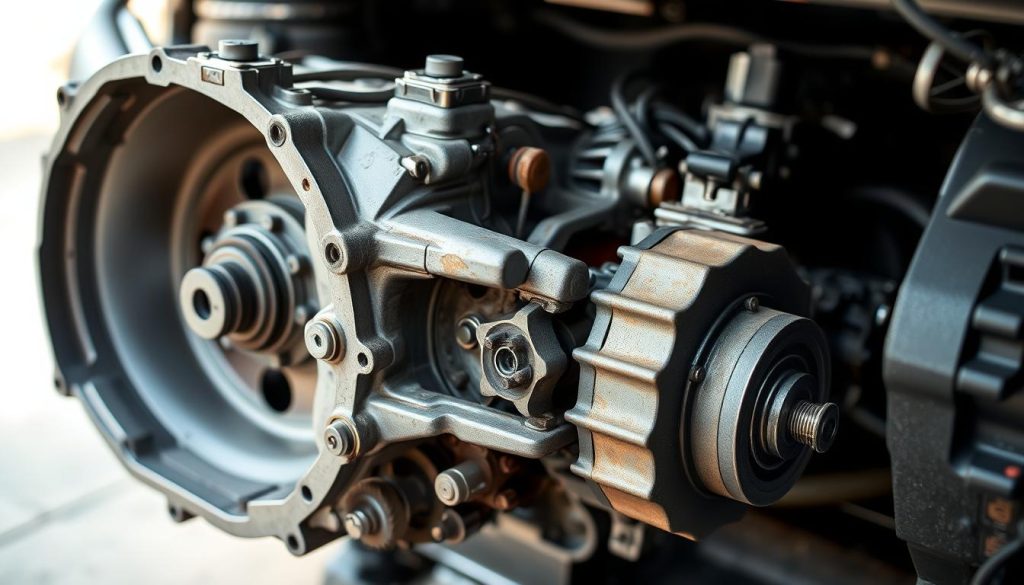
Yaris (Pre-2017)
Yaris models before 2017 had issues with their CVT transmissions. Drivers faced erratic shifting and slow acceleration. Keeping the fluid levels right and sticking to service schedules can reduce these problems.
Fluid Maintenance for Toyota Transmissions
Keeping your Toyota’s transmission fluid in top shape is key for its long life and smooth running. Right fluid maintenance stops big problems and keeps your car running well.
Importance of Correct Fluid Type
Choosing the right fluid is critical because each Toyota model has its own needs. For example, some need Toyota Genuine ATF WS fluid, made just for Toyota transmissions. Wrong fluid can cause shifting issues and wear out your car faster. Always check your owner’s manual for the right type.
Frequency of Fluid Changes
Changing your transmission fluid regularly is a must. You should do it every 30,000 to 60,000 miles, depending on how you drive and your car’s model. If you drive a lot in city traffic or tow heavy loads, you might need to change it more often. Regular care can stop big problems before they start.
- Regular Inspection: Check fluid levels every month to spot leaks.
- Monitor Color and Smell: Fresh fluid is bright red and smells sweet. If it’s dark or smells burnt, it’s time to change it.
- Timely Replacement: Stick to the manufacturer’s schedule for fluid changes to keep your car running best.
Software Updates for Better Transmission Performance
Modern Toyota vehicles get a big boost from regular software updates. These updates keep the transmission system running well. They fix issues like shifting delays and erratic behavior.
Updating your vehicle’s software can make it accelerate better and shift smoothly. It also improves fuel efficiency. These changes make your car more enjoyable to drive and extend the life of your transmission.
Toyota dealerships usually do these updates during service visits. They use special tools to find and install new software. This step is key to keeping your car’s transmission in top shape.
It’s smart to watch for updates from Toyota and book a service quickly when they’re announced. This way, your Toyota stays efficient and you avoid expensive repairs later.
Transmission Overheating: Causes and Solutions
Toyota transmission overheating problems can affect many models, like the Camry and RAV4. It’s important to know the causes and take steps to prevent them. This helps keep your transmission in good shape.
Overheating happens when the transmission gets too much stress or doesn’t cool enough. Driving in heavy traffic, towing heavy loads, or driving too aggressively can cause it. Also, low or dirty transmission fluid can make it worse.
To fix these issues, consider these steps:
- Regularly check and maintain transmission fluid levels. Use the correct type as your vehicle’s manual suggests for best cooling and lubrication.
- Install auxiliary transmission coolers if you often tow heavy loads or drive in hot weather.
- Make sure to have routine transmission services with a skilled mechanic. This helps catch and fix problems early.
- Be careful with your driving. Avoid a lot of stopping and starting, and let your car warm up before driving hard.
Acting early against Toyota automatic transmission problems can save you money and extend your transmission’s life. Regular care, the right fluid levels, and careful driving are essential. They help prevent overheating and keep your Toyota’s transmission running well for longer.
Mechanical Failures in Toyota Transmissions
Mechanical problems in Toyota transmissions can really hurt how well your car runs. They often need a pro to fix. Issues like worn-out gears, broken solenoids, and failing torque converters can cause different problems.
Even though Toyotas are reliable, their transmissions can fail. Broken gear teeth make the car noisy and shift poorly. Faulty solenoids cause weird gear changes. A failing torque converter makes the car shudder and slip when you accelerate.
It’s key to catch these problems early. Signs include strange noises like grinding or clunking, and slow gear changes. Fixing these issues fast helps keep repair costs down. Ignoring them can lead to much higher costs.
Here’s a quick look at some common mechanical failures:
| Mechanical Issue | Symptoms | Potential Repair Cost |
|---|---|---|
| Worn-out Gears | Grinding Noises, Gear Slippage | $800 – $1,500 |
| Broken Solenoids | Erratic Gear Changes, Transmission Overheat | $300 – $750 |
| Failing Torque Converter | Shuddering, Slipping During Acceleration | $1,200 – $2,500 |
Knowing about these issues and fixing them early can save you money and hassle. Watching for symptoms and getting repairs quickly keeps your Toyota running smoothly and reliably.
The Cost of Toyota Transmission Repairs
Knowing the cost of Toyota transmission repairs is key for car owners. The price can change a lot, depending on the model and the repair needed. Small fixes like leak repairs or worn part replacements are cheaper than big repairs or replacing the whole transmission.
When planning for Toyota transmission repair costs, it’s important to understand all the expenses. Here’s a look at typical costs:
| Repair Type | Estimated Cost Range |
|---|---|
| Minor Repairs (Leaks, Sensor Replacement) | $150 – $400 |
| Medium Repairs (Valve Body Replacement) | $500 – $900 |
| Major Repairs (Rebuilding Transmission) | $1,200 – $3,500 |
| Full Transmission Replacement | $4,000 – $8,000 |
To save money on Toyota transmission repairs, keep your car well-maintained. Regular fluid checks, timely services, and software updates can help. These steps can prevent costly repairs later on.
To find affordable Toyota transmission solutions, get quotes from different shops. Comparing these can help you find the best deal without sacrificing quality. Also, consider using aftermarket parts for some repairs. They can be cheaper, but make sure they’re high-quality to avoid future problems.
Toyota Transmission Warranty Coverage
Understanding the Toyota transmission warranty can be a big help. It covers many parts of the transmission and CVT, giving Toyota owners peace of mind.
The warranty lasts for 60,000 miles or five years, whichever comes first. It protects against defects and wear-and-tear. If you have Toyota CVT warranty issues, like belt slippage or noise, you’re covered too.
To get the most from your warranty, follow the recommended maintenance. Also, tell your dealership about any problems right away. This keeps your transmission running well and makes claims easier.
Knowing what’s covered by the warranty is key. Here’s a quick list:
- Manufacturing defects
- Premature wear-and-tear
- Transmission control module issues
- Belt slippage in CVTs
- Abnormal transmission noises
To make a warranty claim, you need to keep service records. Make sure these services are done at authorized Toyota centers. This makes the process smoother and faster. The Toyota transmission warranty is a strong protection against costly repairs.
How to Prolong the Life of Your Toyota Transmission
To make your Toyota transmission last longer, you need to take care of it and drive smart. Here are some tips to keep your car running well and reliably.
- Regular Fluid Checks: Checking and changing the transmission fluid regularly is key. Use the right fluid to keep everything running smoothly.
- Avoid Overloading: Don’t overload your car. It puts too much stress on the transmission. Stick to the weight limits set by the maker.
- Smooth Driving Habits: Drive gently. Avoid sudden starts and stops. It’s easier on the transmission.
- Use the Parking Brake: When parked on an incline, use the parking brake. It helps the transmission’s parking pawl.
- Stay Current With Software Updates: Keep your transmission control software updated. New updates can improve how your transmission works.
By following these tips, you can make your Toyota transmission last longer. This means your car will keep running well for years to come.
Should You Repair or Replace Your Toyota Transmission?
Choosing between repairing or replacing your Toyota transmission can be tough. You need to think about several things to make the right choice. This will help you find the best solution for your situation.
The age and mileage of your car are key. For newer cars with low mileage, fixing the transmission might be a good option. But for older cars, it might be better to replace it because other parts might also need to be replaced soon.
Think about the costs too. Fixing a transmission can cost less at first than replacing it. But if the repairs are big or if there are many problems, replacing might be cheaper in the long run.
A mechanic’s inspection can help you understand the damage. They can tell if small fixes will work or if you need a new transmission. Sometimes, even if repairs are possible, they might not last long enough to be worth it.
Also, think about your car’s resale value. A new or rebuilt transmission can make your car more valuable. But an old, fixed transmission might not be as appealing to buyers.
By considering these points, you can make a better choice. This will help you find a cost-effective solution that meets your needs now and in the future.
Finding a Reliable Mechanic for Toyota Transmission Repairs
When you face Toyota transmission issues, finding a trusted mechanic is key. Look for an ASE certified mechanic. This means they have the latest skills. Also, check if they have experience with Toyota models. Knowing the brand’s quirks helps them fix your car faster.
Reading online reviews on Yelp or Google can give you a good idea. They show how reliable and customer-friendly the mechanic is. Ask them about their experience with similar transmissions. Also, ask for references from other Toyota owners.
A good mechanic for Toyota will give you clear prices and warranty options. This gives you peace of mind and protects your investment. By following these tips, you’ll find a reliable mechanic for Toyota. Your car will run smoothly.
Conclusion
Understanding and fixing Toyota automatic transmission problems is key to keeping your car running well. We’ve looked at signs like jerky acceleration and unusual noises. These are early warnings of possible transmission issues.
Specific problems affect different Toyota models, like the Corolla and Camry. Regular maintenance, like fluid checks and software updates, is vital. Using the right transmission fluid and changing it on time helps prevent failures.
Tools like OBD2 scanners and service manuals help spot and fix problems early. This leads to effective solutions for Toyota automatic transmission issues.
Knowing when to repair or replace your transmission is important. Finding a trustworthy mechanic can save you money and stress. By following our advice, you can keep your car running smoothly for many years.
FAQ
What are some common symptoms of Toyota automatic transmission problems?
Signs include jerky or slipping when you accelerate, strange noises, and delayed shifting. The check engine light might also come on. You might also see overheating warnings.
How can I troubleshoot my Toyota transmission issues?
Start by using your service manual and watching for warning signs. Check the transmission fluids and use an OBD2 scanner for diagnostics.
What should I know about CVT (Continuous Variable Transmission) in Toyota models?
It’s important to understand how CVT works and the common issues it faces. Following maintenance tips is key for its proper function in Toyota vehicles.
Which Toyota models are known for specific transmission problems?
Models like the Corolla (2014–2021), Camry (2012–2018), RAV4 (various years), and Yaris (pre-2017) often have transmission issues.
How important is fluid maintenance for Toyota transmissions?
Using the right fluid and changing it as recommended is vital. It keeps your transmission running smoothly and lasts longer.
Are software updates available for improving Toyota transmission performance?
Yes, updates can improve your transmission’s performance. Check with your dealer to see if they’re available and how to apply them.
What causes transmission overheating in Toyota vehicles, and how can I prevent it?
Overheating can be caused by low or dirty fluid, towing, or stop-and-go driving. Regular maintenance and quality fluids can prevent it.
What are the common mechanical failures in Toyota transmissions?
Problems often include issues with the torque converter, solenoids, and bands. These usually need a professional to fix.
How much does it typically cost to repair a Toyota transmission?
Costs vary based on the problem. They can range from a few hundred to several thousand dollars. Knowing the issue and looking for ways to save can help with costs.
What does Toyota transmission warranty coverage include?
Coverage varies by model and year. It usually includes repairs or replacements for certain parts under specific conditions. Check your owner’s manual for details.
What steps can I take to prolong the life of my Toyota transmission?
Regular maintenance, using the correct fluid, driving well, and fixing issues quickly can extend your transmission’s life.
Should I repair or replace my Toyota transmission?
Consider your vehicle’s age, repair costs, and long-term benefits. Sometimes, replacing the transmission might be more cost-effective.
How do I find a reliable mechanic for Toyota transmission repairs?
Look for certified mechanics, read reviews, and ask about their Toyota experience. This helps find a skilled and trustworthy mechanic.

